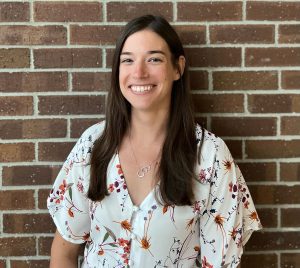- Ph.D. student
Biography
Michelle is from Orlando, Florida, and received a B.S. in Biology from the University of Central Florida (UCF) in 2016. After completing her undergraduate studies, Michelle worked in the Coastal and Estuarine Ecology Lab at UCF as a lead field technician until 2018. During that time, she led field research on avian community structure and behavior, and long-term ecological monitoring on restored oyster reefs and shorelines in the Indian River Lagoon (IRL), FL. In the spring of 2019, Michelle joined LLACE as a master’s student, eventually transitioning to a Ph.D. student.
Michelle Shaffer is in the fourth year of her dissertation research and is a 3rd year fellow of the Forage Fish Research Program. Her research investigates the influence of natural and anthropogenic drivers on estuarine food webs at various spatial and temporal scales, and levels of complexity (e.g., species level, community level, ecosystem level). Her study area, the Indian River Lagoon (IRL), is a 250 km-long estuarine ecosystem situated along the central and southeast coast of Florida. Many economically important species use IRL habitat for spawning, foraging, and shelter. However, the IRL faces both natural and anthropogenic pressures including sea level rise, wastewater and fertilizer run off, and loss of habitat through urbanization. Little is known about how these compounding pressures have impacted estuarine food webs and population dynamics in the IRL.
Specifically, the first chapter of her dissertation examines the influence of abiotic variables and seagrass habitat on predator and forage fish abundance, with particular emphasis on the reduction of seagrass habitat after the 2011 harmful algal bloom. This research will help IRL resource managers understand how the regular occurrence of harmful algal blooms and associated decline of seagrass meadows may affect recreationally important fish. In her second and third dissertation chapters, Michelle utilizes zooarchaeological data from the IRL to better understand changes in community structure and ecosystem resilience over time. First, she will compare present-day ecological communities to historic (~1,500 years ago) ecological communities using multivariate analyses. Then Michelle will evaluate the resilience and other ecosystem-level metrics of present-day and historic ecosystems, by building the first food web models for the IRL. She will use compound-specific stable isotope analysis and bulk stable isotope analysis of present-day and historic fish vertebrae to help tune the food web models. By providing context to how the estuarine communities have changed over longer time scales (>500 years), IRL resource managers can better evaluate what can be considered an historic ‘healthy’ status within the system.
Outside of her research, Michelle spends most of her time rock climbing, traveling with her partner, and chilling (but not so chill) with her dog. Michelle has been rock climbing for 6 years and loves the creativity and physicality of the sport. This is how she met her partner, Eugene. Michelle and Eugene enjoy traveling together, including regular trips to Utah for climbing. They recently got a dog, Biggie, who is a bit bonkers but very cute. The jury is still out on whether he is actually a good boy.

